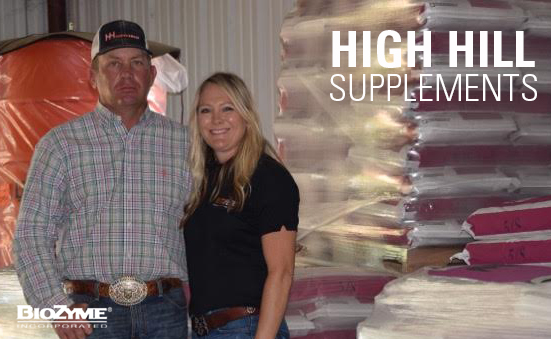For any business, inventory is a major asset.
Just ask Kevin and Sandra Warnken, owners of Rockin W Ranch in Schulenburg, Texas. The couple manages the family’s Hereford and commercial cattle operation and work as on-farm dealers for BioZyme® with the company name of High Hill Supplements.
Sandra Warnken says the biggest misconception of inventory might be that businesses do not place enough priority on managing the items they have in stock. Because they recognize inventory as their single largest asset, the Warnken’s consistently utilize inventory management to also improve their bottom line.
Though every business has different needs Sandra says all businesses could benefit from being strategic about inventory. For High Hill Supplements, inventory rotation is an important aspect of their store. The Warnken’s believe it is vital for a business to have quick turnover of products on the shelf.
“Inventory on the floor for more than four to six weeks ties up valuable operating capital that may be needed to grow the business or purchase new equipment,” Sandra says. “In an effort to reduce inventory stock, demand is up for timely deliveries. Retailers do not want to overstock on products so when ordering they expect to have the product delivered within a certain time frame.”
Sandra says this equates to a big part of High Hill Supplements success, which is also its delivery service. Many times the Warnkens can be found delivering products before or after hours because they know a customer needs it right away. Many of their customers are ranchers just like Rockin W so the Warnkens believe they understand what those customers need and when.
“We know what works best for the particular area they may be in – for instance, our customers along the coast have the best results with consumption when their cattle are on a mineral that has a lower salt level,” Sandra says. “It’s all about personally knowing your customers and their operations and what works best for them.”
The Warnkens carefully watch product inventory, which they say is determined by the demand in their area. In order to keep product fresh, they try not to allow inventory on the floor more than three weeks. They keep staple products in stock at all time, including VitaFerm® Concept•Aid® 5S, Concept•Aid POWER Tubs, VitaFerm Cattleman’s Blend™, Sure Champ® Cattle and the entire Vita Charge® line.
The Warnken’s use Intuit QuickBooks for tracking inventory, including purchases, sales, adjustments, damages and margins. They enter accounts payable the same day product is received and invoice customers the same day product is delivered. Sandra says this process keeps their book inventory accurate with physical inventory. She also does a physical inventory count every six months to ensure computerized inventory is accurate.
High Hill Supplements also works to pass along product promotions to its customers. For example, when there is a promo Warnken will stock up on that item and in turn, offers every piece of inventory purchased to their customer base at the special price, even if it’s past the promotional deadline.
Sandra knows inventory management can be a balancing act between having too much cash tied up in inventory yet maintaining adequate product so the business doesn’t lose sales. Her advice is to take time to implement good inventory management practices including studying sales history, knowing the customer base and knowing the need for seasonal products.
Biozyme’s south Texas Area Sales Manager, Jay Willingham, helps the Warnken’s keep track of livestock shows, which in turn means they have Sure Champ products on hand during a busy show season.
“On the show side, we keep track of all the local, county and major shows as well as tag-in dates,” she says. “This helps us manage our Sure Champ line and helps us ensure we have what our customers need.”
High Hill Supplements also relies on sales reports from previous years to manage the inventory they need. These reports take into account projected growth, and help them personally understand what their customers will need and when. Sandra says it’s also critical to pay attention to the seasons. In her area of Texas fly season starts as early as March. This means they keep fly control products in stock beginning March 1.
Warnken says good inventory management is vital to the success of her family business.
“Proper inventory management keeps our products fresh,” Warnken says. “It enables us to meet our customers’ needs, reduces overhead and increases our bottom line.”
